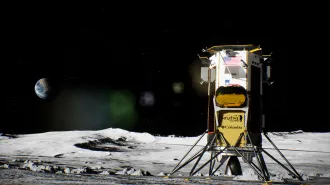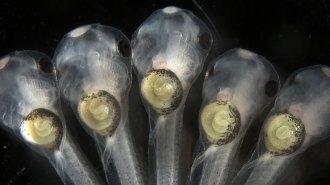Uncategorized
-
 Plants
PlantsAncient trees’ gnarled, twisted shapes provide irreplaceable habitats
Traits that help trees live for hundreds of years also foster forest life, one reason why old growth forest conservation is crucial.
By Jake Buehler -
 Health & Medicine
Health & Medicine50 years ago, computers helped speed up drug discovery
In 1974, a computer program helped researchers search for promising cancer drugs. Today, AI is helping speed up drug discovery.
-
 Astronomy
AstronomyJWST spies hints of a neutron star left behind by supernova 1987A
Signs of highly ionized atoms in dusty clouds at SN 1987A’s explosion site suggest a powerful source of X-rays — likely a neutron star — lurks within.
By Adam Mann -
 Space
SpaceThe first U.S. lunar lander since 1972 touches down on the moon
Odysseus, the first spacecraft to land on the moon since NASA’s Apollo 17, ended up tipped on its side but it appears to be operating OK.
By Christopher Crockett and Adam Mann -
 Health & Medicine
Health & MedicineThe United States was on course to eliminate syphilis. Now it’s surging
Science News spoke with expert Allison Agwu about what’s driving the surge and how we can better prevent the disease.
-
 Physics
PhysicsPhysicist Sekazi Mtingwa considers himself an apostle of science
After big contributions in accelerator physics, Sekazi Mtingwa has been focused on opening science for everyone.
By Elise Cutts -
 Health & Medicine
Health & MedicineMessed-up metabolism during development may lead guts to coil the wrong way
Tadpoles exposed to a metabolism-disrupting herbicide had malformed intestines, providing clues to a human condition called intestinal malrotation.
-
 Animals
AnimalsA new book explores the transformative power of bird-watching
In Birding to Change the World, environmental scientist Trish O’Kane shows how birds and humans can help one another heal.
-
 Science & Society
Science & SocietySocial media harms teens’ mental health, mounting evidence shows. What now?
Recent studies suggest a causal link between teen social media use and reduced well-being. Now, some researchers are looking into possible mechanisms.
By Sujata Gupta -
 Health & Medicine
Health & MedicineTaking a weight-loss drug reduced a craving for opioids
Early results from 20 people with opioid use disorder raise hopes that popular weight-loss drugs like Wegovy can tackle opioid addiction, too.
-

-

Come along with us on a mathematical mystery tour
Editor in chief Nancy Shute discusses an unexpected breakthrough on a puzzle that has intrigued mathematicians for almost a century.
By Nancy Shute